Mastering Doubling Down Strategies in Blackjack
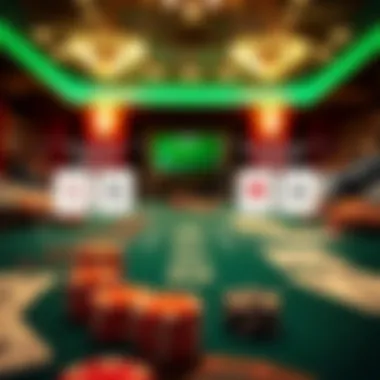

Intro
Understanding the subtleties of blackjack can greatly enhance your experience at the table, especially when it comes to the concept of doubling down. This strategic move is not just a simple decision to double your bet; it’s a nuanced aspect that can significantly shift the odds in your favor if applied correctly. In this article, we’ll take a closer look at what doubling down means, when to employ it, and the potential benefits it brings to your gameplay.
The term "doubling down" often evokes images of high stakes and tense moments in a casino setting. It refers to the act of doubling your original bet after receiving your first two cards, but there are specific conditions that dictate when this tactic is most effective. A thorough grasp of these scenarios will not only bolster your gameplay but also improve your overall understanding of blackjack as a whole.
Additionally, we’ll delve into various strategies, from beginner guides to advanced techniques, ensuring that players of all skill levels can find applicable insights. We will dissect game insights, reviews, and trends in gambling, allowing readers to contextualize their knowledge in the ever-evolving landscape of blackjack. So, buckle up as we embark on this detailed exploration of doubling down in blackjack.
Intro to Blackjack Strategies
In the world of blackjack, understanding strategies can be as crucial as mastering the rules. Relying solely on luck often doesn't cut it when sitting at the felt. Players who know their way around various strategies tend to fare better over time. Strategy isn’t just a concept; it’s a practical tool that can significantly elevate a player’s chances of winning.
The Importance of Strategy
Having a solid strategy in blackjack is like having a reliable map in uncharted territory. Most players understand the basic concept: get as close to 21 without going over. Yet, the nuances of how to achieve that goal often elude many. Strategies can dictate when to hit, stand, or double down, each decision molded by a player’s hand and the dealer's upcard. A well-rounded strategy can provide a significant edge, as it introduces a measure of control over the seemingly unpredictable nature of the game.
For instance, knowing when to double down can increase potential winnings substantially. A strategic player will recognize situations to maximize their stakes rather than relying on gut feelings. This leads to informed decision-making rather than guesswork, ultimately elevating the overall experience and success rate at the table.
Overview of Basic Blackjack Rules
Before delving into advanced strategies, it is essential to grasp the basic rules of blackjack. Each game starts with players receiving two cards, usually face up, while the dealer gets one face-up card and one face-down (the hole card). The objective remains to accumulate a hand value as close to 21 as possible, without exceeding it.
- The card values are pretty straightforward: cards two through ten are worth their face values, face cards (kings, queens, jacks) are worth ten, and aces can either be one or eleven, depending on which value benefits the hand.
- Players have several choices each round: hitting (taking another card), standing (keeping their current hand), splitting (if they have a pair, they can divide their cards into two hands), and doubling down (doubling their original bet in exchange for one more card).
Understanding these rules lays the groundwork for all strategies, as they offer a framework for how each decision, including doubling down, fits into the game flow.
The interplay between strategic decisions and fundamental rules shapes the landscape in which players find their rhythm, fine-tuning their skills while working to outsmart the dealer. To delve deeper into the nuances of blackjack strategy, consider referencing resources like Wikipedia or engaging in community discussions on platforms like Reddit. This can provide a more rounded view and deepen the understanding of strategies such as doubling down.
What Does Doubling Down Mean?
In the context of blackjack, the term "doubling down" carries significant weight. This strategic maneuver can be the turning point between a modest outcome and a victorious play, thereby making its understanding crucial for any player looking to enhance their blackjack skills. Doubling down allows players to double their original bet after receiving their first two cards, provided they are satisfied with their initial hand. This not only increases the risk but also amplifies the potential reward if executed at the right time. It's about seizing opportunities, but knowing when to pull the trigger can make all the difference in your game.
Definition of Doubling Down
At its core, doubling down means increasing your initial wager in hopes of capitalizing on a favorable hand. After placing your original bet and receiving two cards, you have the option to double that bet in exchange for receiving only one more card. This can be an appealing option when you believe that the next card you will draw could potentially give you an advantageous total against the dealer’s upcard. For instance, if you have a total of eleven, you might choose to double down with the expectation that drawing a ten could give you a strong hand of 21.
- Key Features of Doubling Down:
- Requires an initial bet
- Only one additional card is drawn
- Must be executed right after the first two cards
Understanding this concept lays the groundwork for intelligent decision-making while playing. Without confident knowledge of doubling down, a player might miss out on opportunities to maximize winnings or might unintentionally increase losses.
Historical Context of the Term
The origins of Blackjack and, subsequently, the term "doubling down" trace back to the 17th century. The game evolved from a French game called "Vingt-et-un," which translates to twenty-one. The doubling down option gained traction as the game made its way across Europe and eventually into American casinos. Early treatments of the game didn’t clearly define this aspect, leading to various interpretations across different regions and establishments.
The practice of doubling down became formalized with the establishment of standard rules in casinos. In many ways, the evolution of the terminology surrounding blackjack reflects broader trends in gambling culture, revealing how strategies adapt and grow in complexity over time. This historical context not only enriches one’s understanding of the game but also highlights the significance of strategy and adaptability in gambling practices.
"Understanding the past gives insights into the mechanics and approaches players adopt today."
Ultimately, to fully grasp the strategic implications of doubling down, players must also appreciate its roots in the overall history of the game. Recognizing its development allows for a richer, more nuanced approach to blackjack strategies.
This foundational knowledge about doubling down arms players with the skill set to make informed decisions at the table.
When to Consider Doubling Down
In the realm of blackjack, the term doubling down doesn’t merely represent a play; it’s a tactical choice that can significantly alter the dynamics of the game. Understanding when to effectively utilize this strategy can pave the way for not just an enjoyable experience but also a more fruitful one. Doubling down can amplify wins in favorable situations, making the player more engaged in the outcome of their hand. However, with great power comes responsibility—one must weigh the benefits against the potential pitfalls diligently.
Optimal Situations for Doubling Down
Doubling down is best reserved for prime scenarios where the odds tilt favorably. Here are key situations where doubling down feels right:
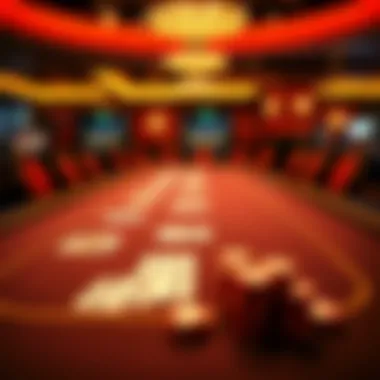

- Starting Hand of 11: When you hold a total of eleven, your chances of getting a ten or face card is a staggering 30.7%. This presents a ripe opportunity to double your bet, setting up for a significant payout if luck is on your side.
- Soft Hands: A soft hand, containing an Ace that can count as either 1 or 11, provides more leeway. If you have a soft 16 or a soft 17 against a dealer’s lower card, doubling down can often be the wisest choice, as it opens the door for a strong finish without risking a bust too easily.
- Dealer's Weak Upcard: If the dealer shows an upcard of 4, 5, or 6 (often called the dealer bust cards), players should consider doubling down. The dealer is more likely to bust when faced with these cards, allowing players to leverage their strength against a potential weakness.
In these optimal scenarios, the ability to double down translates into a tactical advantage. The key is recognizing and acting upon these moments, as they can determine the flow of the game.
Understanding Your Hand and the Dealer's Upcard
For a comprehensive grasp of when to double down, it’s crucial to analyze not only your hand but also the dealer's card. This two-pronged approach increases your strategic clarity.
- Self-Assessment: Take stock of your hand total and the composition of your cards. If you’re holding a strong hand (like a total of 9, 10, or 11) or a soft hand (like an Ace-5), these cards signal opportunities for doubling down.
- Dealer’s Upcard: Observe what card the dealer is showing. If they’re facing a card like 2, 3, 4, 5, or 6—this traditionally weak range signifies vulnerability. Players should consider how their own strong hand plays against the dealer's upcard. It’s like playing a game of chess, where anticipating the opponent’s moves can lead to victory.
Taking both your hand and the dealer's face card into account can turn the tide in your favor. Being aware of these factors ensures that you’re not just going with gut feeling but are embracing a strategy built on good reasoning and the laws of probability.
Doubling down when conditions align can lessen the uncertainty in a game where luck often reigns supreme.
Strategic Considerations
In the realm of blackjack, strategic considerations represent the backbone of successful gameplay, particularly when it comes to employing the doubling down strategy. Understanding when and how to double down can make or break a player's overall success at the table. It's not just about intuition; it is about making calculated decisions based on the hand you hold and the dealer's visible card. These choices hinge on well-defined strategies that can greatly influence the outcomes of your gameplay.
Doubling down involves increasing your bet by 100% after being dealt your initial two cards, with the expectation that the next card will further enhance your chances of winning. However, it also requires a keen understanding of your position in the game and the inherent risks associated with this decision. The push and pull between potential rewards and risks makes this strategy both enticing and daunting.
A sound grasp of the following strategic elements can significantly bolster your blackjack experience:
- The Importance of Timing: Knowing when to double down is crucial. Players should be acutely aware of their own hands and the dealer's upcard before making this significant move.
- Statistical Analysis: Leveraging odds and probabilities can provide a competitive edge in determining favorable scenarios for doubling down.
- Observation of Trends: Paying attention to patterns in gameplay can help players understand whether it’s the right time to double down.
To maximize the effectiveness of doubling down, players should never overlook the importance of honing their strategy. This involves a mixture of practical experience and theoretical knowledge, which can lead to more informed and strategic decisions at the blackjack table.
Card Counting and Doubling Down
Card counting remains one of the most discussed and debated techniques among seasoned blackjack players. This method, while often perceived as a complex strategy reserved for only the most dedicated players, can actually provide significant insight when it comes to deciding whether to double down.
What is Card Counting?
At its core, card counting is a systematic strategy that tracks the ratio of high to low cards left in the deck. Players assign values to cards:
- High cards (10, J, Q, K, A) = -1
- Neutral cards (7, 8, 9) = 0
- Low cards (2, 3, 4, 5, 6) = +1
By maintaining a running count and dividing it by the number of decks still in play, a player can obtain a 'true count' that indicates whether the remaining cards favor the player or the dealer.
When the count is high, players have a greater chance of being dealt strong hands. This is precisely when doubling down can be advantageous, as the odds swing in favor of the player.
Practical Application of Card Counting
- Increased Doubling Occasions: A high true count means players should double down more often, as the probability of improving their hands is higher.
- Avoiding Poor Situations: Conversely, when the count is low, players should be more cautious and avoid doubling down unless absolutely necessary.
By incorporating card counting into the decision-making process, players are not merely riding their luck but making decisions based on calculated risk, thus enhancing their overall gameplay experience.
Risk vs. Reward Analysis
Doubling down is often described as a high-risk, high-reward strategy. Yet, it begs the question: is the potential upside worth the inherent risk? This analysis warrants serious contemplation, as it can dictate one's approach to the game.
Understanding Risk Factors
- Financial Exposure: Doubling down effectively doubles your initial bet, meaning higher stakes and potentially greater losses if the hand does not go in your favor.
- Limitations on Third Cards: Once you double down, you are only allowed one additional card, adding pressure to make that draw count.
Evaluating Rewards
- Potential Gains: The reward can be visually compelling. Scoring a blackjack after doubling down can lead to significant winnings.
- Psychological Boost: Winning after a smart double down can enhance the player's confidence, which may lead to more strategic plays.
By engaging in a thorough risk vs. reward analysis before deciding to double down, players can align their tactics with their overall betting strategy, either expanding their bankroll smartly or stepping back to limit losses.
Utilizing these strategic considerations can help players refine their blackjack skills and navigate through the nuanced world of doubling down effectively.
Common Scenarios for Doubling Down
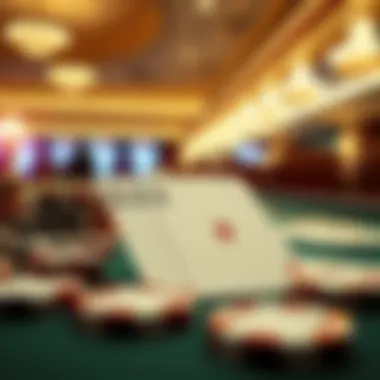

Doubling down in blackjack isn’t just a cool move; it's one of the key strategies that players need to master. When applied correctly, it can convert a decent hand into an exceptional one, elevating the excitement and potential rewards during gameplay. Understanding when to double down can significantly improve a player’s odds and enhance their overall gaming experience. It’s about maximizing gains while managing risks effectively.
Hand Combinations that Favor Doubling Down
One of the primary factors in deciding to double down is the composition of your hand. Certain hand combinations create a favorable situation. The ideal scenario is to have a total of 10 or 11. Why? These numbers give you the best chance to hit a card that will make 21 or at least a strong hand.
For example, if you hold a total of 10 and the dealer has a low card, say 4 or 5, it’s time to bet more money on the table. You're in a strong position. Here are some combinations worthy of doubling down:
- Total of 10 or 11: The probability of getting a ten-value card (10, J, Q, K) is higher, bringing you closer to 21.
- Soft 16, 17, or 18: If you have an Ace combined with a 5, 6, or 7, you have a decent chance of strengthening your hand without the risk of busting.
- A hand containing an Ace: Any soft total involving an Ace (like Ace-7) can work well, as it allows flexibility in receiving another card.
Such scenarios are mere gold mines for doubling down opportunities, allowing players to capitalize on the advantages presented by the dealer’s upcard and their current hand.
Adverse Situations and Their Impact
While doubling down can be a powerful strategy, it is essential to recognize when it might backfire. Not every scenario will be rosy, and being aware of adverse situations helps in making better judgment calls when the chips are down.
Imagine holding a total of 12, facing a dealer showing a 10. At first glance, it might seem like a perk to double, but this is often a trap. If you double down here and draw a low card, you’ve just stacked your bet on a weak hand—a precarious gamble that could lead to steep losses.
It's crucial to understand how the dealer's showing card interacts with your own hand. If they display high cards (like 9, 10, or Ace), your chances of success diminish. Here are some common adverse situations to think about:
- Dealer showing high cards (8, 9, 10, or Ace): You’d do better to play conservatively rather than risking your stack.
- Holding a weak total (12-16): Doubling down may not be wise against a strong dealer.
- Unfavorable table dynamics: Rushing the decision due to emotions or peer pressure can lead to poor choices.
A crisp approach to your strategy makes a world of difference between cutting losses and enjoying success. Remember, it’s important to approach doubling down with a clear mindset, free from the emotional ramp-ups that the game can sometimes bring.
Overall, mastering the timing of when to double down hinges significantly on understanding both favorable combinations and adverse scenarios. By weaving these insights into your strategy, you pave the way for a more robust approach to blackjack.
Psychological Aspects of Doubling Down
Understanding the psychological elements at play when considering doubling down in blackjack reveals much about a player’s decision-making process. The stakes are high, and how one feels in a given moment can greatly impact their choices at the table. Here, we explore the emotional influences and cognitive biases that can steer players toward doubling down, for better or worse.
The Role of Emotion in Decision-Making
In blackjack, emotions can be a double-edged sword. When players find themselves in a favorable situation, such as having a strong hand or the dealer showing a weak upcard, they may feel confident and inclined to double down. This surge of confidence can push them to make bold plays, potentially leading to significant wins. However, this heightened state also comes with its pitfalls.
For instance, a player on a winning streak might feel invincible, which could cloud their judgment. They might overlook critical aspects of the game in favor of emotional highs. On the flip side, feelings of frustration or anxiety after consecutive losses could lead players to make hasty decisions, opting to double down in a bid to recover their losses without properly weighing the risks.
In blackjack, emotion often dictates strategy. Decisions should ideally be based on calculated risks rather than emotional responses. Those seeking to master the art of doubling down need to cultivate emotional detachment at the table. Aiming for a cool-headed approach might increase the likelihood of making sound decisions.
Cognitive Biases and Their Effects
Another layer to understanding the psychology behind doubling down involves cognitive biases, which can skew a player's perception and choices. One common bias is known as the gambler’s fallacy. This leads players to believe that past losses will eventually result in a win, pressuring them to double down in situations that may not warrant it. The reality, however, is that each round of blackjack operates independently of the last, rendering this bias detrimental.
Additionally, the illusion of control often comes into play when players feel they can influence the outcome of their hands. If they have doubled down successfully before, they may chase that feeling again, ignoring the mathematical probability surrounding their current hand.
Another cognitive trap is the confirmation bias, which encourages players to recall only those scenarios where doubling down paid off, while conveniently forgetting the times it didn’t. This selective memory can have a compelling effect on one's strategy and ultimately leads to inconsistent decision-making.
In blackjack, awareness of these biases is key. Players must recognize when their judgment is being swayed by emotional highs or cognitive traps. By understanding how psychology impacts their choices, they can develop a more disciplined approach to the game.
"The brain is the most important betting tool you possess. Use it wisely to make informed decisions at the blackjack table."
This insight into the emotional and cognitive dimensions of doubling down offers players a holistic view of strategy that transcends basic rule adherence. Cultivating a mental approach that embraces rationality while understanding natural human tendencies can be pivotal in enhancing success at the blackjack table.
Doubling Down Variations Across Casinos
When it comes to the game of blackjack, understanding the nuances of doubling down is essential, especially considering the variations that exist across different casinos. Not every establishment adheres to the same set of house rules, and knowing these differences can significantly impact your strategy and potential winnings.
House Rules and Their Implications
In blackjack, each casino holds a unique set of house rules that govern how the game is played, including how doubling down is handled. Some casinos permit players to double down on any initial two-card hand, while others may restrict this option to specific combinations, such as only pairs or totals of 9, 10, and 11.
Understanding these rules is key. For instance, if you’re in a casino that allows doubling down after splitting pairs, your strategy could vary greatly from one that forbids this move. This freedom can open up new avenues for profit, but it also means you need to be extra cautious not to overextend yourself. Always check the house rules posted at the table before you start playing; they can be a game-changer.
Additionally, be mindful of the dealer's upcard, as some house rules might influence what actions are permitted based on that card. For example, in some places, doubling down might be less favorable when dealing with a dealer’s strong card.
"Not all casinos are cut from the same cloth; it's wise to read the fine print before laying down your chips."
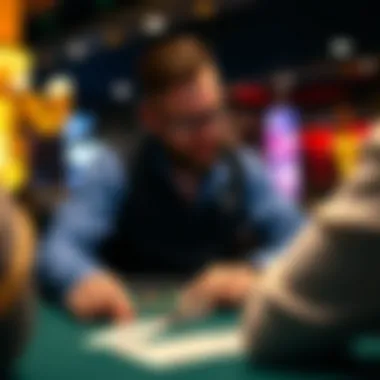
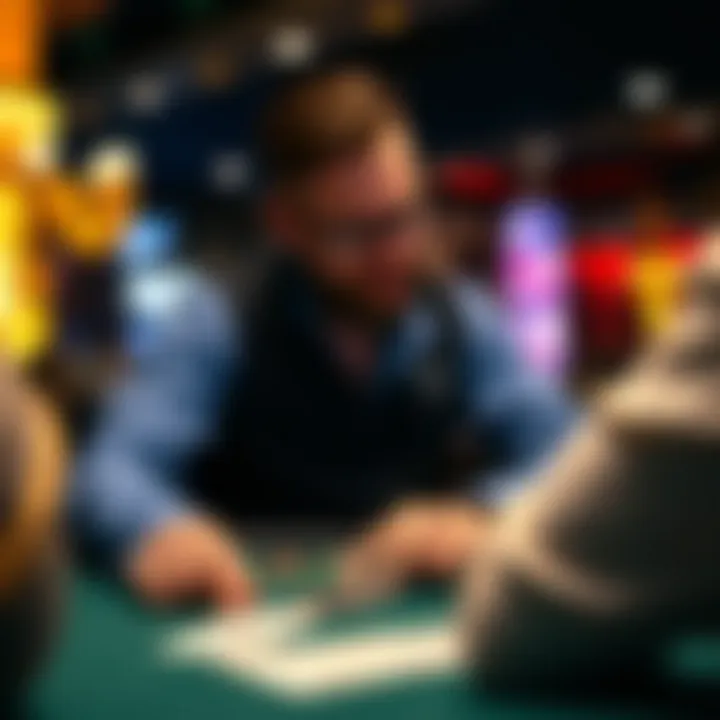
Online vs. Live Casino Experiences
The landscape of blackjack is further complicated when considering the differences between online and live casino environments. In the online realm, many platforms offer a range of variations for the rule of doubling down, often showcasing different versions of the game that cater to various player preferences.
For example, some online casinos may provide an option where you can double down on three-card hands, or even allow you to choose your double-down amount freely, rather than sticking to the standard bet. This flexibility can be appealing to many players who wish to experiment with their strategies.
Conversely, live casinos tend to stick to more traditional rules but can still differ from one venue to another. The players' physical interaction during a live game can also lend a psychological edge; observing others can help guide your decisions. However, the limitations often placed on doubling down in live settings can dampen one’s ability to adapt swiftly to game dynamics compared to the fluid options available online.
Statistical Insights on Doubling Down Outcomes
In the world of blackjack, the strategy of doubling down is not simply about luck or instinct. It’s a method deeply rooted in mathematical principles and statistical probabilities that can significantly influence a player's success. If you want to make informed decisions at the blackjack table, understanding the statistics behind doubling down is crucial. This section explores the role of probabilities and long-term implications related to bankroll management when implementing this tactic.
Probabilities of Winning When Doubling Down
When considering whether to double down, the numbers must guide you. Statistically, the success rate of doubling down varies depending on the player’s hand and the dealer's upcard. Research indicates that when you double down on a total of 11 against a dealer showing a weak card like 5 or 6, your chances of winning can soar above 60%.
- A few key statistics to ponder:
- If your hand totals 10 or 11, the probability of ending up with a total of 20 or 21 if you hit is considerably higher than when holding lower values.
- Doubling down tends to yield a higher average payout compared to just hitting. You receive an extra card, which could push you closer to 21, enhancing your win potential dramatically.
Another critical statistic to remember is the house edge. In many blackjack games, when you double down, the house edge lowers significantly, offering an enticing avenue to boost your overall returns. However, remember that each casino has specific rules that can also shift these probabilities slightly.
The smarter you play, the hotter your chances.
Long-Term Effects on Bankroll Management
Bankroll management is fundamental for any player gravitating towards doubling down. It's not just a strategic move but a potential game-changer for your budget. While doubling down can lead to higher wins, it can also increase risks if the outcome doesn’t work in your favor, resulting in larger losses. Understanding the statistical background enables you to minimize risks and maximize your fun.
To manage your bankroll effectively while incorporating doubling down into your gameplay, consider the following strategies:
- Set Limits: Determine in advance how much you are willing to stake each session. Doubling down raises the stakes; don’t let this catch you off guard.
- Monitor Your Wins and Losses: Keeping track of your hits and losses offers insight into whether your strategy is paying off. Adjust accordingly instead of relying solely on gut feelings.
- Know When to Walk Away: If you notice a streak of losing rounds—even with doubled bets—consider taking a break. Losing continuously can chip away at your funds quickly.
The long-term implications of doubling down can be fruitful if played with strategy and discipline. By managing your bankroll wisely and understanding the statistical odds, the strategy can serve you well in the thrilling and unpredictable game of blackjack.
Player Profiles and Doubling Down
When it comes to blackjack, understanding player profiles is crucial for anyone looking to master the art of doubling down. This aspect reveals how different players approach the game and make decisions based on their personalities, experiences, and strategies. Individual styles can greatly influence outcomes, especially when using strategic moves like doubling down, where players increase their stakes under particular circumstances.
Knowing player profiles allows one to identify specific elements that contribute to success while also acknowledging common pitfalls. With a deeper understanding of how various players react to doubling down, one can tailor their approach, refine strategies, and learn from others, boosting overall performance at the table. The ability to predict or recognize the tendencies of fellow players and the dealer can turn the tide in high-stakes situations.
Profiles of Successful Players
Successful blackjack players often display certain traits that set them apart from the rest. Here are a few defining characteristics:
- Risk Assessment: They have a keen eye for assessing when the odds favor a double down. They weigh their hand vs. the dealer's upcard calmly, ensuring they don't fall prey to emotional decisions.
- Bankroll Management: These players know how to manage their bankroll effectively. They decide how much to stake when doubling down based on the current state of their funds. Risk-taking doesn’t mean reckless betting for them.
- Adaptability: Effective players adjust strategies based on the game dynamics. This may mean straying from typical doubling down scenarios if the dealer’s play warrants it. They're flexible, not rigid in their approach.
- Experience and Analysis: Many successful players keep records of their games to analyze outcomes over time. They learn from each blackjack session, noting which hands or dealer cards contributed to success or loss during doubling down.
Understanding these profiles equips aspiring players with the knowledge of what works in practice. Consider the methods and mindsets employed by top players, which can serve as a blueprint for enhancing one’s game, particularly in regards to doubling down.
Mistakes to Avoid
When participating in blackjack and employing a doubling down strategy, various mistakes can sabotage your efforts. Here are some common errors that players should be keen to sidestep:
- Ignoring Basic Strategy: Many players forget or overlook the fundamental strategies, relying solely on gut feelings or emotions. This can lead to poor decisions, like doubling down when the odds are not favorable.
- Chasing Losses: Trying to recoup losses by doubling down can be detrimental. It's crucial to understand the appropriate moments for this action instead of making impulsive choices based on previous losses.
- Overestimating Hands: Some players believe that having a strong hand will always warrant a double down. This is not always the case, as the dealer's strength must be considered too.
- Forgetting to Adjust for House Rules: Each casino can have slightly different rules when it comes to doubling down. Not adhering to these can result in unexpected losses.
- Emotional Betting: Decisions made in a heated moment often prove detrimental. Successful players think rationally and do not allow their emotions to steer their betting decisions.
Recognizing and addressing these common mistakes can significantly amplify a player’s chances of success when doubling down. By learning from others and understanding both the successful profiles and the pitfalls, players can forge their path to improvement.
Ending
In summarizing the overarching themes of doubling down in blackjack, it is essential to recognize that this strategy is not merely a risk-taking gamble but a calculated decision that can significantly impact gameplay. Understanding the nuances of when and how to double down serves as a cornerstone in developing a proficient approach to the game. The concept extends beyond simple rules; it's about grasping the intricacies of the game and making informed choices based on statistical contexts and strategic scenarios.
Summarizing Key Takeaways
- Timing Matters: Knowing the right moments to double down is critical. Players should be well-acquainted with hand combinations and the dealer's upcard to determine the best scenarios for applying this tactic.
- Emotional Control: The psychological aspect shouldn't be underestimated. Players must manage their emotions and resist the urge to double down out of sheer excitement or pressure.
- Statistical Edge: Familiarizing oneself with the probabilities surrounding doubling down can offer players a significant edge. This knowledge helps in risk assessment during gameplay.
- Bankroll Management: Doubling down can have a substantial effect on a player's bankroll strategy. Being mindful of when to double down can mean the difference between a successful strategy and a steep bankroll decline.
Final Thoughts on Doubling Down in Blackjack
To wrap it up, doubling down in blackjack transcends beyond just a clever term; it represents a strategic maneuver that holds the potential for increased winnings when employed correctly. For both novice players and seasoned gamblers, embracing what doubling down means within the context of blackjack can lead to more informed decision-making. The concept encourages a balance between risk and reward and fosters a deeper comprehension of the game. As one navigates the thrill of the casino floor or the quiet focus of online play, remembering the insights shared about doubling down will lead to a richer experience.
As you engage with the game, keep these takeaways in mind. Mastery of the doubling down strategy not only amplifies your potential returns but enriches your overall understanding of blackjack as a whole.







